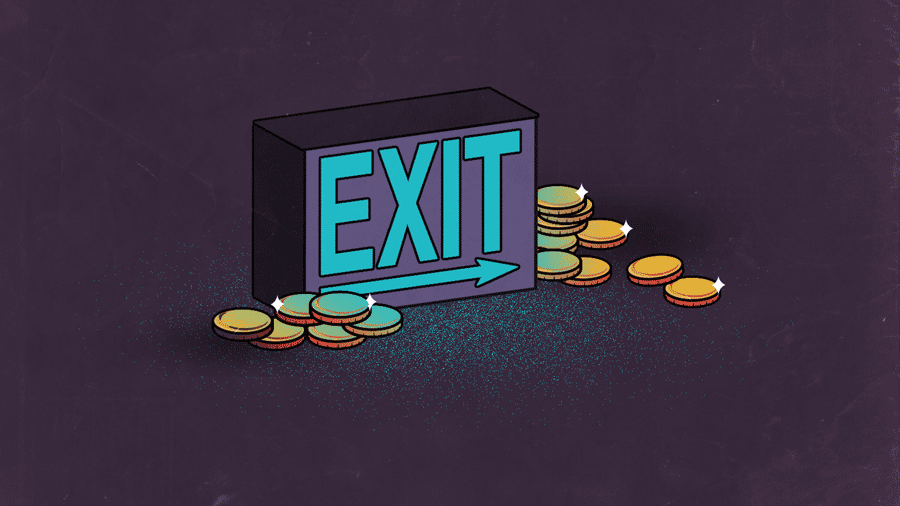This post was written by Micah Rosenbloom. Micah is a managing partner at Founder Collective, a seed stage VC firm that has invested in Uber, The Trade Desk, Cruise, PillPack, SeatGeek, Dia & Co., and many other startups.
At Founder Collective, we’ve invested in 270 companies, and only one has gone public so far. Of the rest, 30 have gone out of business, 60 have been acquired, with the remainder are still in operation. The reality is that when starting a company, the most likely outcomes are bankruptcy or acquisition.
When I was fundraising for my first two ventures, it was universally accepted that you needed a slide at the end of your pitch that focused on exits. It was common for the slide to list a series of potential acquirers, their markets caps, along with standard industry multiples—even a completely made up potential acquisition price for your company. I’m glad that fiction is gone, and we’re dreaming bigger and thinking longer term now. However, overly bold visions can come at the entrepreneur’s expense.
Follow Crunchbase News on Twitter & Facebook
Somewhere along the way, talking about acquisitions has fallen out of favor. Entrepreneurs and VCs ignore their most-likely endpoint, and some even get offended when you suggest they consider M&A. I think this is partially an internalization of the “go big or go home” mentality.
I admire the bravado of wanting to build a massive public tech company. We want our entrepreneurs to think big. Bold thinking leads to brilliant outcomes. But not every company will go public. The data shows that the average acquired startup that does exit sells for ~$150M. There’s no shame in a $100M exit, and even those sales require considerable skill to execute. So spend some time thinking about what you’d do if Google knocked on your door carrying a giant-sized check.
The economics of many VC funds require billion dollar exits. The economics of founders’ lives do not, so don’t let your investor’s business model drive irrational behavior in fundraising, spending, or selling. Remember that selling a company for $30 million can sometimes lead to better returns for the founder than selling for 10X as much.
Thinking carefully about selling your company can mean the difference between a sad shutdown, a below average acquihire, or an outright bidding war. Unlike investors, entrepreneurs don’t get to index their risk across a portfolio. Having seen dozens of exits over the years, totaling billions of dollars, here’s the M&A advice we share with founders.
Startups Can Be Sold
The notion that “startups are bought not sold” is half-true balderdash. The best founders build relationships with potential acquirers over time so that when they need to sell the groundwork has been laid.
Conventional VC wisdom is to not fraternize with large companies—what have you got to gain? However, I subscribe to the Godfather maxim: “Keep your friends close and your enemies closer.” You never know if a corporate nemesis may one day be your savior.
M&A teams may well try to lead you on—remember that they are partially in the talent requisitions business. Building commercial relationships instead of just M&A conversations is great.
Before Each Fundraise, Have An M&A Gut Check
Before going out to raise more money, founders and investors should have “the talk.” Is it time to sell? Sometimes it’s a short chat because there is so much apparent progress to be made. However, if the vision for the future is cloudy, you should make a clear-eyed assessment about selling.
It’s easy to forget that everytime you raise money, you’ve also sold your ability to take certain exits. Everyone should have a clear-eyed appreciation of the fact that each funding round adds risk because the exits required are much larger. It’s prudent to discuss this with your co-founders and investors before raising more capital. Also, if you decide to raise more money (and the business has made material progress), founders should consider taking money off the table to de-stress the need for liquidity.
How Long Would It Take You To Grow Into A Valuation?
Instead of thinking of an acquisition in terms of dollars, think of it in terms of years. How many years would it take you to grow into the valuation being offered or solicited? My partner Eric Paley wrote a great post with a framework on how to think about exit values and selling out without selling your soul. Thinking in years forces you to consider opportunity cost and risk, in addition to pure monetary value, both of which can be clarifying considerations.
Know Your Number
Even if you’re not planning on running a process to sell your company, if you’ve raised a Series A or beyond, you should give some thought to what you’d do if a serious offer was made for your company.
Part of this consideration is personal. What would be a price you’d seriously consider? Are there acquirers you’d absolutely not want to partner with? Figure out what matters to you and your team before you are in the fog of M&A talks.
Another aspect of preparation is procedural. Have you hired an auditor to review your financial controls on a regular basis and prepare financial statements that will make sense to outsiders?
Your Ego Is Important But Not Paramount
If you are growing rapidly and have control of your destiny, by all means, stay the course. If users are validating your deep convictions about new product launches, absolutely continue to build your business. However, when growth slows or your product sense falters at scale, you owe it to your team to keep an open mind with regard to M&A talks. If you no longer have a clear vision on how to grow the company, you have an obligation to consider selling. Merely raising more money and hoping you’ll figure it out is not a viable strategy.
Many solid companies have gone bankrupt in pursuit of an unrealistic end goal and by mindlessly raising more and more capital. Most of these companies could have sold for sums that would have enriched employees, founders, and shareholders, but the investors and entrepreneurs decided to roll the dice and “go big.” Don’t take foolhardy risks because you don’t want to admit the company didn’t grow as big as you hoped or promised.
Don’t Stress Your Team
An M&A process can be a roller-coaster for founders, but it’s important not to let it weigh on the team. Don’t lie to your employees when they ask why a dozen “suits” start spending a lot of time in your office but avoid broadcasting every twist and turn of the negotiations. Some employees may be concerned about their jobs, others might be calculating the value of their options, but you want everyone on the team to stay focused for two reasons:
- Negotiations tend to take months, and you can’t afford to let the numbers slip just because you’re focused on M&A. Doing so could end up lowering the value or killing the deal altogether.
- M&A discussions can fall apart suddenly, so you don’t want to lose momentum on growing your business in case the deal falls apart and you need to raise more money.
Consider Hiring A Banker
Bankers serve three roles in an M&A process:
- They find multiple potential buyers which will do more than anything to increase the value of the deal.
- They provide advice on navigating a process that can be fraught with risk for first-time founders.
- They help with negotiation, if nothing else, by acting as a 3rd party you have to check with before agreeing on anything. It turns out having a bad cop can be worth quite a bit of money.
Just as real estate brokers may seem like overpaid intermediaries, more often than not bankers feel expensive but generate more values than their fees.
Ask As Much As Possible, Share As Little As Practical
Any acquirer interested in your company will have done a lot of diligence about your market and competitors. Even if the deal fails to close, you can learn tremendous amounts about the competitive landscape by asking smart questions. By the same token, be careful about how much information you share.
Beware Bad Earnouts
It’s only fair that any M&A deal includes earn-outs to keep everyone focused and aligned, but slick corporate development lawyers may inflate the price of an acquisition by larding it up with unreachable earnout milestones. Before agreeing to any deal, make sure the milestones are strategic and could be hit even without the addition of major resources or in the face of obstacles in the new host company.
Treat Yourself & Your Team
Put most of the money in the bank and consider helping those less fortunate. I’ve seen founders take their teams on a trip or give some other memorable gift. It’s great when everyone shares in the victory together. Also, get ready to go back to work, because the exit was never the point in the first place; it was about building a great product, solving an important problem, and working with great people. That’s the greatest exit of all.

Stay up to date with recent funding rounds, acquisitions, and more with the Crunchbase Daily.





![Cybersecurity illustration with shield, books, laptop. [Dom Guzman]](https://news.crunchbase.com/wp-content/uploads/Cybersecurity_Shield-470x352.jpg)
![Illustration of a guy watering plants with a blocked hose - Global [Dom Guzman]](https://news.crunchbase.com/wp-content/uploads/quarterly-global-3-300x168.jpg)
67.1K Followers